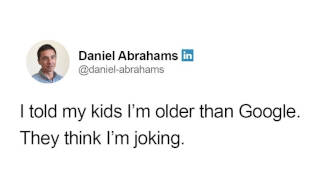[Photo by Mikey Harris on Unsplash]
Good morning,
Oliver Sacks is among our favourite writers. Through his works, he left a rich legacy that offers us much to think about. Last evening, we picked up his last book, Gratitude, a collection of four essays. He wrote it as he was nearing the end of his life. This passage describes his thoughts on being told his time has come.
“I feel a sudden clear focus and perspective. There is no time for anything inessential. I must focus on myself, my work, and my friends. I shall no longer look at the NewsHour every night. I shall no longer pay any attention to politics or arguments about global warming.
“This is not indifference but detachment—I still care deeply about the Middle East, about global warming, about growing inequality, but these are no longer my business; they belong to the future. I rejoice when I meet gifted young people—even the one who biopsied and diagnosed my metastases. I feel the future is in good hands.
“When people die, they cannot be replaced. They leave holes that cannot be filled, for it is the fate—the genetic and neural fate—of every human being to be a unique individual, to find his own path, to live his own life, to die his own death.
“I cannot pretend I am without fear. But my predominant feeling is one of gratitude. I have loved and been loved; I have been given much and I have given something in return; I have read and traveled and thought and written. I have had an intercourse with the world, the special intercourse of writers and readers.
“Above all, I have been a sentient being, a thinking animal, on this beautiful planet, and that in itself has been an enormous privilege and adventure.”
Stay safe. Be grateful. And have a good day.
In this issue
- What if your employees want to work from home permanently?
- The underbelly of perfectionism
- How old are you?
What if your employees want to work from home permanently?
A few months ago, when business leaders discussed the post-pandemic workspace, they assumed three possibilities. A) Getting all employees back to office B) Hybrid C) Letting people work from home as if the lockdown never ended. Most of them agreed that the most likely scenario is B, and most of the discussions were around finer details—such as how many days of work from home.
A Dice Insights piece in Medium collates what has been happening in some big tech firms in the US.
- “A new article in CNet describes Google employees as ‘angry’ over the search engine giant’s remote-work policies. Although Google CEO Sundar Pichai has instituted a ‘hybrid’ work policy that allows the Google workforce to do their jobs from home for a portion of the week, that’s apparently not enough for a subset of employees.”
- A subset of [Apple’s] employees recently sent a letter to CEO Tim Cook, asking him to allow permanent remote work: “Many of us feel we have to choose between either a combination of our families, our well-being, and being empowered to do our best work, or being a part of Apple.”
Dig deeper
The underbelly of perfectionism
The pursuit of perfectionism is celebrated in the times we live in. What can possibly be wrong with it? Isn’t it the pursuit of perfectionism that leads to mastery? That is why an essay from the archives of BBC.com by its managing editor Amanda Ruggeri had our attention. It makes a distinction between the pursuit of excellence as opposed to chasing perfection.
“Perfectionism, after all, is an ultimately self-defeating way to move through the world. It is built on an excruciating irony: making, and admitting, mistakes is a necessary part of growing and learning and being human. It also makes you better at your career and relationships and life in general. By avoiding mistakes at any cost, a perfectionist can make it harder to reach their own lofty goals.
“But the drawback of perfectionism isn’t just that it holds you back from being your most successful, productive self. Perfectionistic tendencies have been linked to a laundry list of clinical issues: depression and anxiety (even in children), self-harm, social anxiety disorder and agoraphobia, obsessive-compulsive disorder, binge eating, anorexia, bulimia, and other eating disorders, post-traumatic stress disorder, chronic fatigue syndrome, insomnia, hoarding, dyspepsia, chronic headaches, and, most damning of all, even early mortality and suicide.”
Dig deeper
How old are you?

(Via LinkedIn)
Found anything interesting and noteworthy? Send it to us and we will share it through this newsletter.
And if you missed previous editions of this newsletter, they’re all archived here.
Bookmark Founding Fuel’s special section on Thriving in Volatile Times. All our stories on how individuals and businesses are responding to the pandemic until now are posted there.
Warm regards,
Team Founding Fuel
(Note: Founding Fuel may earn commissions for purchases made through the Amazon affiliate links in this article.)


